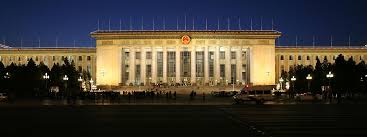
Six years ago today, my family and I hauled 22 50-pound cardboard boxes into the Detroit airport and moved to Shanghai, the largest city in the People’s Republic of China. My time living in a communist country showed me just how fortunate the American people are to endure elections like the one we just finished, even when we must choose between candidates like Hillary Clinton and Donald Trump.
This January, Donald Trump will raise his right hand and take office, and we, the people, have nothing to complain about: we had the opportunity to make an informed decision, and we made it. In four years, we’ll do it again — that’s how our democracy works.
The communist horror stories I collected in China tend to shock Americans. When CNN’s foreign correspondents comment on the Chinese Communist Party, televisions all over the Middle Kingdom fade to black. Complain about the regime’s rampant corruption in an email, and your memo disappears into cyberspace. Belittle President Xi Jinping over the phone, and the line reduces to static.
But what best illustrates the great a gift of the American political system is not big brother’s looming shadow. It’s actually a portrait and a tomb.
Tiananmen square is a vast slab of concrete in the middle of Beijing, China’s capital. Towering around its perimeter — the National Museum of China, the Great Hall of the People, the Forbidden City, and the Mausoleum of Mao Zedong. Everyday, tourists line up to traipse past the embalmed body of the chairman before walking underneath his massive portrait adorning the entrance to the preserved Ming imperial city.
From 1958 to 1962, Mao starved over 45 million people to death through his attempt to catapult his country into an agricultural and industrial revolution, as explained in Frank Dikötter’s “Mao’s Great Famine.” This number was estimated by Chen Yizi, a senior party official who fled China after the Tiananmen Square Massacre and released his approximated death count in an interview years later.
While the numbers hover around 50 million, an official count has not been released — the communist party destroyed it or something. However, a more concrete evidence remains: the memory of the Chinese people. The four years that destroyed China haunt the Middle Kingdom’s older generation who survived Mao’s great famine and the Cultural Revolution, launched just four years later.
The man who decimated an entire generation of people, and destroyed generations of Chinese heritage, is still celebrated in the nation’s capital and recognized as a national hero by the government.
Spin the globe back to the United States, and suddenly the political forecast for the next four years looks okay. We have access to sound information. We can pitch a fit over every move the president makes. And if all hell breaks loose, we can always impeach.
Most importantly, we voted. And in four years, we’ll vote again.
Ms. Scheu is a junior studying French and journalism.

